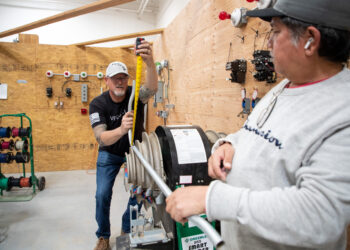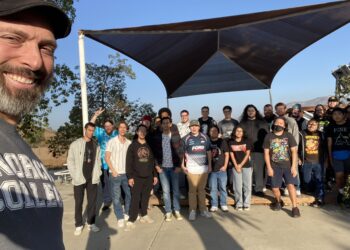IEDRC College Serving Communities During the Pandemic
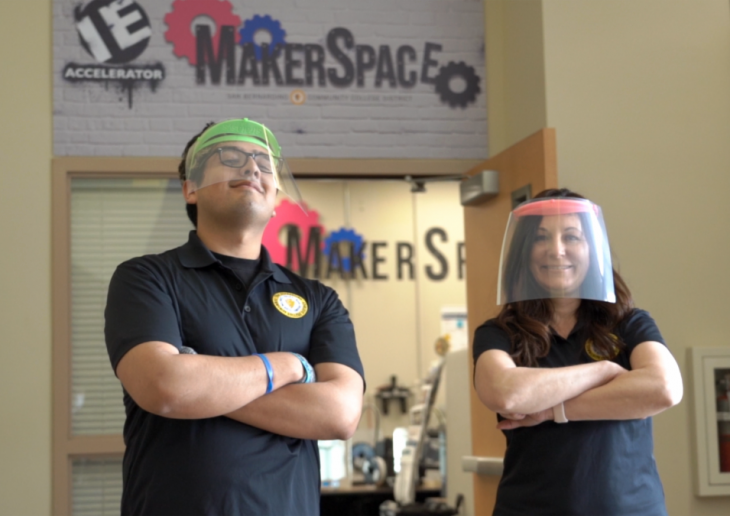
A shifting landscape has required all 12 of the Inland Empire/Desert region’s colleges to move classes online and look for new ways to reach students despite an ongoing pandemic and closed campuses. Amidst the change, Inland Empire’s colleges have been working to connect their campuses to the community and, more importantly, their students.
Barstow Community College
At BCC, a team led by Dr. Crystal Nasio, BCC’s career education academic administrator, quickly assembled to create a face shield prototype using the software and equipment available in the college’s “makerspace.”
“The prototype was a huge success and received approval from the Barstow Community Hospital Infection Control Director, as well as others in the region,” a news release from BCC says. “Through this collaborative effort, innovative thinking, and great entrepreneurship, the teams have secured an initial purchase order for 5,000 face shields and more is expected.”
The community colleges in the region are partnering to fulfill this order, and are also in talks with local high schools and others in the community to help speed up the production.
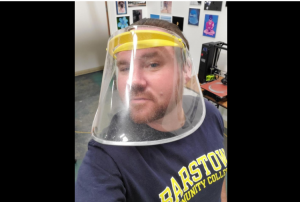 Along with the donation of time and labor from staff working on this project, BCC has contributed $5,000 toward materials.
Along with the donation of time and labor from staff working on this project, BCC has contributed $5,000 toward materials.
College of the Desert
College of the Desert donated thousands of pieces of personal protective equipment, including masks, gowns, hair bonnets, gloves, and shoe coverings to local hospitals and the Desert Aids Project this week as part of the College’s community response to the COVID-19 pandemic.
Nursing staff and faculty returned to campus this week to collect and distribute the equipment, which is normally used as part of the teaching and learning process for the College’s nursing program.
“Staff at Desert Aids, Desert Regional, John F. Kennedy, and Eisenhower Medical Centers were very appreciative of the supplies,” said Carol Scobie, who is the College’s director of nursing and allied health.
The College has successfully transitioned all of its face-to-face classes online, which includes all of its nursing courses. Third- and fourth-semester RN students are providing health screenings at the Desert Aids Project and running COVID-19 phone banks at Eisenhower Medical Center. Both LVN and RN students are spending time in online simulations, enhancing their clinical thinking and judgement skills.
Copper Mountain College
Copper Mountain College has opened up their campus for coronavirus testing.
Anyone, regardless of whether they show symptoms, may get tested for the new coronavirus. Testing is free and available to any San Bernardino County resident. You do not have to have health insurance.
Nurses with the county Department of Public Health will test using throat swabs and may also use antibody tests, which involve a quick stick of the finger to get a drop of blood.
Residents can apply for an appointment at sbcovid19.com today.
If you cannot access the form online, call the COVID-19 hotline at (909) 387-3911 from 9 a.m. to 5 p.m. Monday through Friday.
Crafton Hills College
Crafton Hills College student Gabriel Zavala said the most important thing he is learning in paramedic school amid a global pandemic is adaptability.
“EMS is a constantly changing field,” he said. “During times of worldwide adversity, maintaining composure is the only way to persevere, and composure is essential while working in the field.”
To be eligible for licensure as a paramedic in California, students must complete the 39 units of the certificate program, pass National Registry written and skills examinations, and meet all other licensure requirements established by the state. Crafton Hills’s paramedic program offers two cycles per year, and is broken down into three sections—didactic, clinical, and field.
Zavala said the program’s instructors are helping students to stay on track to graduate on time. “Our program leaders are admirable, knowledgeable, and helpful during this pandemic,” he said. Students like Zavala are gaining increased amounts of field experience serving their communities alongside first responders.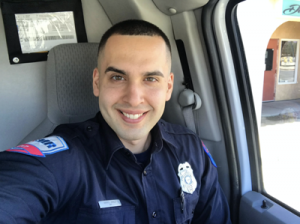
“Working as an EMT, serving the community, and helping others in need is something I will not take for granted,” Zavala said. “I am incredibly honored for the career that I have and what this program continues to teach me.
“Paramedic school has been the most challenging and rewarding time of my life,” he continued. “I am blessed to be in a program with many other great students who I know will be some of the best paramedics once the program is complete.”
Chaffey College, Moreno Valley College, Norco College, and Riverside City College
The all-online semester is an extension of online classes already happening at Chaffey. One in three students take some online classes, said Laura Hope, the college’s associate superintendent of instruction and institutional effectiveness. These students experience a success rate that is 4% higher than students taking in-person classes, Hope said.
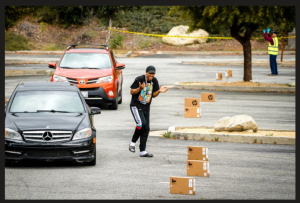 “We have a rich environment already dedicated to distance learning,” she said, and now, with over 29,000 students all online, the college is looking to loan 5,000 laptops, enabling those without computers at home to participate in online classes.
“We have a rich environment already dedicated to distance learning,” she said, and now, with over 29,000 students all online, the college is looking to loan 5,000 laptops, enabling those without computers at home to participate in online classes.
In addition, the Riverside Community College District (which includes Moreno Valley College, Norco College, and Riverside City College) has been working with students as they transition online by providing laptop loans. The district hopes that bridging the technology gap will help students stay enrolled in courses across the region.
Moreno Valley College
Student Chris Cummins won’t graduate from the paramedic program until October, but he is eager to join the front line and help healthcare providers who are battling the coronavirus pandemic. Cummins is among thousands of students nationwide at universities and community colleges in schools of medicine, nursing, and emergency services who might lend a hand to doctors, nurses, and hospital staffers who are overwhelmed by the deluge of COVID-19 cases heading their way.
In California, Gov. Gavin Newsom announced a new effort called the California Health Corps, asking retired doctors, nursing students, medical assistants, emergency medical technicians, and other professionals to sign up to work in California. Cummins, who is training to be a paramedic at Moreno Valley College, said the coronavirus pandemic has solidified his resolve to complete his training and serve his community.
“I’m just very clear in my mind that I want to be out there helping people,” Cummins said. “I view this as a challenge to better myself and help our brothers and sisters in the medical field who are being overworked and stressed. If we complete our training and graduate in time and get into the workforce, we’ll be able to contribute to the care of the people in the community during a very difficult time.”
Mt. San Jacinto College
The Eagle MakerSpace, housed on Mt. San Jacinto College’s Menifee Valley Campus, features 3D printers and a laser cutter that students use throughout the academic year to create various projects at MSJC, and more recently has been used to help supply face shields to the Temecula community. The MakerSpace is funded by the California Strong Workforce Program, which is designed to spur career education within the region. 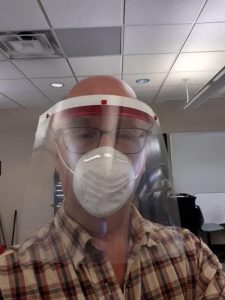
“I’m excited and grateful to be a part of the MSJC and statewide MakerSpace support of my healthcare colleagues on the front lines of this COVID-19 pandemic,” said Hal Edghill, MakerSpace specialist. “The proportions of this challenge are daunting, and keeping doctors, nurses, and all other professionals as safe as possible is the goal.”
The college has donated gurneys, N95 masks, non-N95 masks, nitrile gloves, and other equipment in high demand to protect medical professionals during the crisis. 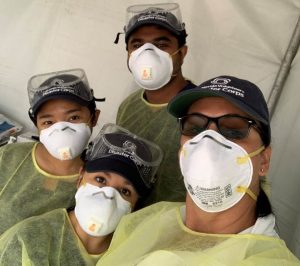
“We were honored to be able to help our medical partners who indicated they had a need for these types of items,” said Joyce Johnson, MSJC’s executive dean of instruction and a registered nurse. “The school closures mean our students cannot use this equipment at this time. We wanted to make sure we did our part to help protect medical professionals and patients alike during this pandemic.”
In addition to providing PPE equipment, MSJC has been filling the gap of needs for their students.
MSJC provided students with computers and hot spots for students to continue their semester online. Students recently took the MSJC Technology Needs Assessment Survey to help the college identify how to best help students succeed online and deliver the technology to students who had the greatest need for the technology.
“MSJC took a data-informed approach so we could deliver technology directly to those students who were most in need of access to a computer or the Internet,” said Dr. Roger Schultz, MSJC’s superintendent/president. “We want them to stay at home and healthy, but we want them to succeed online and complete their educational journeys. We understand not every student has access to computers and other technology when they’re away from our campuses. We’re glad we could help and we plan to help even more.”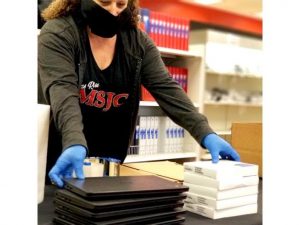
“During this public health crisis, we hope these devices will not only allow MSJC students to access their coursework, but also serve as a vital link to the outside world during the stay-at-home order. Forty percent of MSJC students were already in at least one online class and nearly 17 percent were in a hybrid class, which is part online and part face-to-face.
San Bernardino Valley College
Juan Zavala, 21-year-old SBVC student, has printed 422 medical-quality face shields from the MakerSpace lab at the San Bernardino Community College District. These face shields are gifts for local hospitals: Arrowhead Regional Medical Center in Colton and Mountains Community Hospital in Lake Arrowhead. They have also given face shields to the campus police department and to Providence Healthcare Group, which operates about ten skilled nursing facilities locally.
As hospital staff members arrive to pick up the boxes, there are no handshakes or hugs. But Zavala can tell his work is appreciated. “Their expressions are really great,” he said after Renee and MacKenzie Limpus picked up the order for the Mountains Community Hospital. “I feel like it is a look of hope.”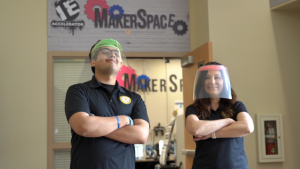
Stacy Jones, who directs the community college MakerSpace project in this region, said she had wanted to partner with the healthcare industry. She even chatted with her colleague Wendy Deras, who leads the healthcare outreach with regional hospitals. COVID-19 has provided the project.
“The circumstances are not good for the world, but it could not be more of an opportunity for us to show what our MakerSpace labs can do,” Jones said.
Deanna Krehbiel, director of economic development at San Bernardino Community College District, is proud of the work. “For almost a hundred years, our district has assisted our local community with training our workforce. Now we’re taking a step further and manufacturing personal protection face shields to help save lives.”
As for hospitals, they are relieved to have found a local source for some of the personal protective equipment that they need.
“We were very, very happy,” said Renee Limpus, an R.N. who is also the disaster coordinator for Mountains Community Hospital. Limpus noted recent efforts to connect community colleges with industry are working.
Victor Valley College
Victor Valley College staff and faculty have stepped up to help supply local hospitals with personal protective equipment (PPE).
Along with nearly 6,000 N95 masks donated by the college’s emergency medical services department, more than 200 reusable cloth masks have been sewn by VVC instructors and students.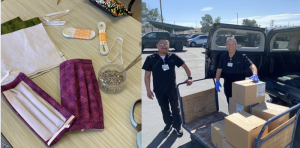 The donations are benefiting Desert Valley Hospital, St. Mary Medical Center, and Victor Valley Global Medical Center.
The donations are benefiting Desert Valley Hospital, St. Mary Medical Center, and Victor Valley Global Medical Center.
“We recognize the valuable partnerships that our local hospitals provide for our emergency medical technician and paramedic students each semester,” said Dave Oleson, program director and department chair of VVC’s emergency medical services. “Providing these masks at a time when they are in such high demand and infrequent availability is just one small way we can repay the time and effort that the nurses, physicians, respiratory therapists, and allied health professionals at these three facilities give to our students during their internships.”
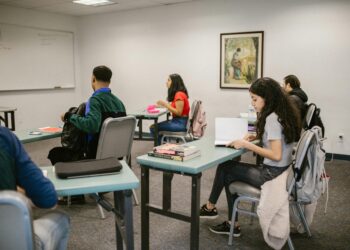

 Along with the donation of time and labor from staff working on this project, BCC has contributed $5,000 toward materials.
Along with the donation of time and labor from staff working on this project, BCC has contributed $5,000 toward materials.
 “We have a rich environment already dedicated to distance learning,” she said, and now, with over 29,000 students all online, the college is looking to loan 5,000 laptops, enabling those without computers at home to participate in online classes.
“We have a rich environment already dedicated to distance learning,” she said, and now, with over 29,000 students all online, the college is looking to loan 5,000 laptops, enabling those without computers at home to participate in online classes. 



 The donations are benefiting Desert Valley Hospital, St. Mary Medical Center, and Victor Valley Global Medical Center.
The donations are benefiting Desert Valley Hospital, St. Mary Medical Center, and Victor Valley Global Medical Center.